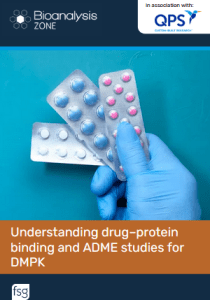Technology Digest: understanding drug–protein binding and ADME studies for DMPK

DMPK: what is it?
In drug development, DMPK studies are performed throughout the development process in order to determine the pharmacological characteristics of a drug candidate, with particular focus on a potential drug’s absorption, distribution, metabolism, excretion (ADME) and pharmacokinetic properties. Drug metabolism refers to the process by which a molecule is converted into other related compounds throughout the body [1]. Pharmacokinetics is the quantitative study of a potential drug’s ADME – the measurement of how much of a drug candidate is available throughout the human body over time [2].
One of the fundamental parameters utilized to develop pharmacokinetic/pharmacodynamic (PK/PD) relationships, predict drug–drug interactions and evaluate drug candidate toxicity is understanding a drug candidates protein binding. A drug’s distribution and protein binding capability changes over its lifetime within the body [3]. As such, proteins exist beyond plasma composition in the bloodstream and bind with drugs in the skin, tissue and organs, understanding how these binding interactions influence the bioavailability and distribution of a drug’s active compounds aid in determining its therapeutic effect [4].
 This eBook includes:
This eBook includes:
- TECHNOLOGY DIGEST: Understanding drug–protein binding and ADME studies for DMPK
- WHITE PAPER: Plasma protein binding
- RESEARCH ARTICLE: Improving the accuracy of unbound fraction measurement of drug-protein binding by preconditioning the RED membrane inserts
PRELIMINARY COMMUNICATION: Solid-phase microextraction for assessment of plasma protein binding, a complement to rapid equilibrium dialysis
Click the ‘Download now’ button in order to access this FREE eBook.
References
- Smith DA. A new phase of drug discovery? The rise of PK/PD means extremely challenging work at the coalface. Bioanalysis, 7(12), 1415–1417 (2015).
- Li Y, Meng Q, Yang M et al. Current trends in drug metabolism and pharmacokinetics. Acta. Pharm. Sin. B. 9(6), 1113–1144 (2019).
- Wanat K. Biological barriers, and the influence of protein binding on the passage of drugs across them. Mol. Biol. Rep. 47, 3221–3231 (2020).
- University of Nottingham. Drugs and plasma proteins: www.nottingham.ac.uk/nmp/sonet/rlos/bioproc/plasma_proteins/page_four.html (Accessed 21 April 2022).
This feature has been brought to you in association with QPS Holdings, LLC. The opinions expressed in this feature are those of the author and do not necessarily reflect the views of Bioanalysis Zone or Future Science Group.
In association with:

